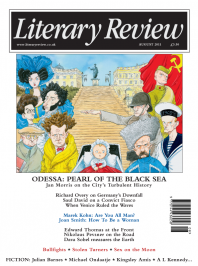Michael Sherborne
A Mirage Up to Nature
Gods Without Men
By Hari Kunzru
Hamish Hamilton 384pp £12.99
The characters in Hari Kunzru’s fourth novel, Gods Without Men, enter the east Californian desert at their peril. With its monumental three Pinnacles, which they all agree to be cosmically significant but interpret differently, the desert is a gigantic Rorschach test that feeds back their deepest fears and desires, crushingly amplified. If there’s any god awaiting them, then it’s the dangerous trickster that the local Indians call Coyote. This protean figure, glimpsed throughout the book, is an appropriate icon for a novelist whose characters specialise in self-reinvention, like the guilt-tormented aircraft mechanic Schmidt who, after several chapters’ absence, reappears as the leader of a UFO cult.
The book is a cross between a novel and a medley of short stories and Schmidt is one of many characters that it presents in moments of crisis and transformation. In his previous books Kunzru tended to divide such shape-shifters into the good, who give themselves up to

Sign Up to our newsletter
Receive free articles, highlights from the archive, news, details of prizes, and much more.@Lit_Review
Follow Literary Review on Twitter
Twitter Feed
The son of a notorious con man, John le Carré turned deception into an art form. Does his archive unmask the author or merely prove how well he learned to disappear?
John Phipps explores.
John Phipps - Approach & Seduction
John Phipps: Approach & Seduction - John le Carré: Tradecraft; Tradecraft: Writers on John le Carré by Federico Varese (ed)
literaryreview.co.uk
Few writers have been so eagerly mythologised as Katherine Mansfield. The short, brilliant life, the doomed love affairs, the sickly genius have together blurred the woman behind the work.
Sophie Oliver looks to Mansfield's stories for answers.
Sophie Oliver - Restless Soul
Sophie Oliver: Restless Soul - Katherine Mansfield: A Hidden Life by Gerri Kimber
literaryreview.co.uk
Literary Review is seeking an editorial intern.